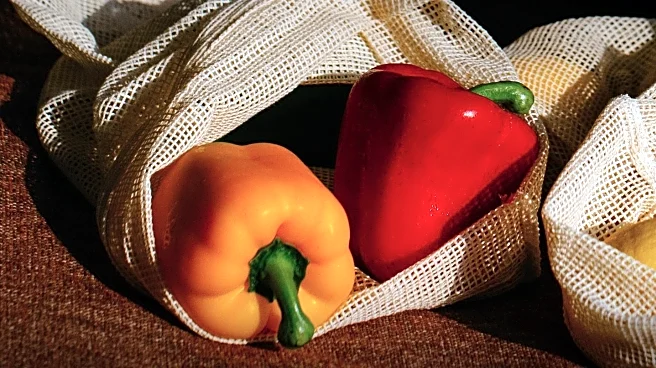What's Happening?
CNET conducted an experiment to determine which type of produce storage bag keeps fruits and vegetables fresh the longest. The test involved three types of bags: compostable bags, mesh bags from Thrive Market, and linen bags from Ambrosia. The produce used
in the experiment included red bell peppers and romaine lettuce, stored in a refrigerator's produce drawer for two weeks. The results showed that linen bags maintained the freshness of the produce better than the other two options. The compostable bags showed signs of spoilage early on, while the mesh bags allowed for more air circulation but less moisture absorption, leading to increased wilting. Linen bags were found to control moisture effectively and allow air circulation, preventing spoilage and mold formation.
Why It's Important?
The findings of this experiment are significant for consumers looking to reduce food waste and maintain the nutritional value of their produce. Linen bags offer a sustainable and effective solution for storing produce, as they help control moisture and allow ethylene gas to escape, preventing premature ripening. This can lead to cost savings for consumers who often find their produce spoiling before consumption. Additionally, the use of linen bags aligns with environmental sustainability goals, as they are antimicrobial and reduce the need for single-use plastic bags. Understanding the best storage methods for different types of produce can enhance food preservation and reduce waste.
What's Next?
Consumers may consider switching to linen bags for produce storage to maximize freshness and reduce waste. Retailers and manufacturers might explore expanding their offerings of linen produce bags, given their effectiveness and environmental benefits. Further research could be conducted to explore the impact of different storage conditions on various types of produce, potentially leading to more tailored storage solutions. Additionally, educational campaigns could be launched to inform consumers about the benefits of using linen bags and proper produce storage techniques.
Beyond the Headlines
The experiment highlights the importance of understanding the specific storage needs of different produce types. It challenges the 'one-size-fits-all' approach to food storage and emphasizes the role of consumer education in reducing food waste. The findings also suggest potential shifts in consumer behavior towards more sustainable practices, as awareness of effective storage solutions grows. This could lead to increased demand for eco-friendly products and influence market trends in the food storage industry.
















